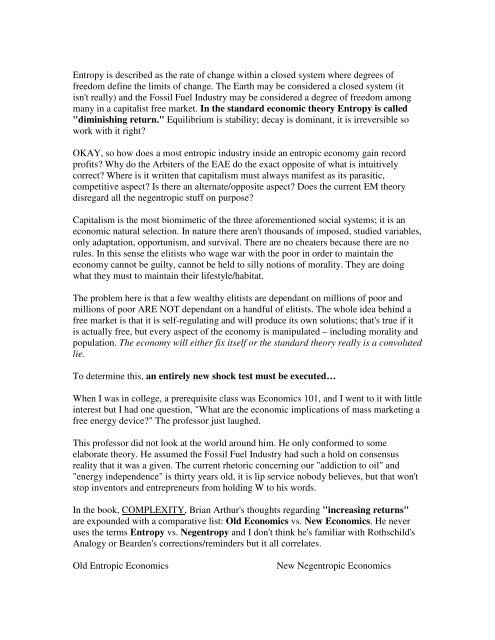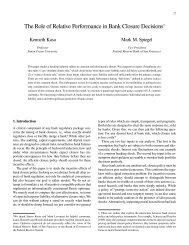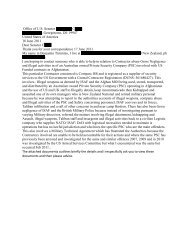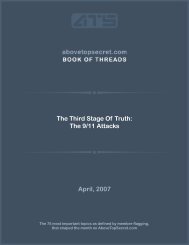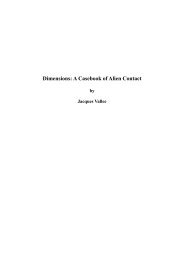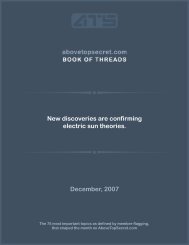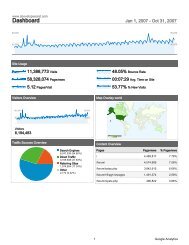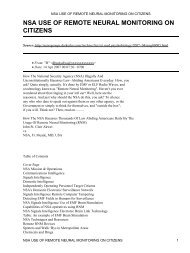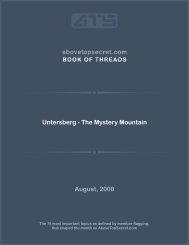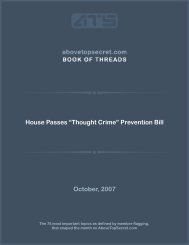For Lilian and the Indigos - Above Top Secret
For Lilian and the Indigos - Above Top Secret
For Lilian and the Indigos - Above Top Secret
You also want an ePaper? Increase the reach of your titles
YUMPU automatically turns print PDFs into web optimized ePapers that Google loves.
Entropy is described as <strong>the</strong> rate of change within a closed system where degrees of<br />
freedom define <strong>the</strong> limits of change. The Earth may be considered a closed system (it<br />
isn't really) <strong>and</strong> <strong>the</strong> Fossil Fuel Industry may be considered a degree of freedom among<br />
many in a capitalist free market. In <strong>the</strong> st<strong>and</strong>ard economic <strong>the</strong>ory Entropy is called<br />
"diminishing return." Equilibrium is stability; decay is dominant, it is irreversible so<br />
work with it right?<br />
OKAY, so how does a most entropic industry inside an entropic economy gain record<br />
profits? Why do <strong>the</strong> Arbiters of <strong>the</strong> EAE do <strong>the</strong> exact opposite of what is intuitively<br />
correct? Where is it written that capitalism must always manifest as its parasitic,<br />
competitive aspect? Is <strong>the</strong>re an alternate/opposite aspect? Does <strong>the</strong> current EM <strong>the</strong>ory<br />
disregard all <strong>the</strong> negentropic stuff on purpose?<br />
Capitalism is <strong>the</strong> most biomimetic of <strong>the</strong> three aforementioned social systems; it is an<br />
economic natural selection. In nature <strong>the</strong>re aren't thous<strong>and</strong>s of imposed, studied variables,<br />
only adaptation, opportunism, <strong>and</strong> survival. There are no cheaters because <strong>the</strong>re are no<br />
rules. In this sense <strong>the</strong> elitists who wage war with <strong>the</strong> poor in order to maintain <strong>the</strong><br />
economy cannot be guilty, cannot be held to silly notions of morality. They are doing<br />
what <strong>the</strong>y must to maintain <strong>the</strong>ir lifestyle/habitat.<br />
The problem here is that a few wealthy elitists are dependant on millions of poor <strong>and</strong><br />
millions of poor ARE NOT dependant on a h<strong>and</strong>ful of elitists. The whole idea behind a<br />
free market is that it is self-regulating <strong>and</strong> will produce its own solutions; that's true if it<br />
is actually free, but every aspect of <strong>the</strong> economy is manipulated – including morality <strong>and</strong><br />
population. The economy will ei<strong>the</strong>r fix itself or <strong>the</strong> st<strong>and</strong>ard <strong>the</strong>ory really is a convoluted<br />
lie.<br />
To determine this, an entirely new shock test must be executed…<br />
When I was in college, a prerequisite class was Economics 101, <strong>and</strong> I went to it with little<br />
interest but I had one question, "What are <strong>the</strong> economic implications of mass marketing a<br />
free energy device?" The professor just laughed.<br />
This professor did not look at <strong>the</strong> world around him. He only conformed to some<br />
elaborate <strong>the</strong>ory. He assumed <strong>the</strong> Fossil Fuel Industry had such a hold on consensus<br />
reality that it was a given. The current rhetoric concerning our "addiction to oil" <strong>and</strong><br />
"energy independence" is thirty years old, it is lip service nobody believes, but that won't<br />
stop inventors <strong>and</strong> entrepreneurs from holding W to his words.<br />
In <strong>the</strong> book, COMPLEXITY, Brian Arthur's thoughts regarding "increasing returns"<br />
are expounded with a comparative list: Old Economics vs. New Economics. He never<br />
uses <strong>the</strong> terms Entropy vs. Negentropy <strong>and</strong> I don't think he's familiar with Rothschild's<br />
Analogy or Bearden's corrections/reminders but it all correlates.<br />
Old Entropic Economics<br />
New Negentropic Economics


